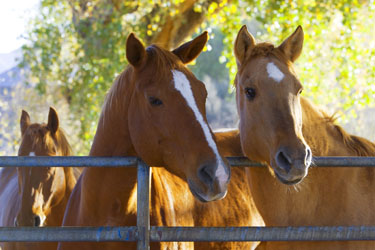Do All Horses Need Vitamin and Mineral Supplements?

Good health requires good food. In times when the dietary needs of a horse are not being met, offering a vitamin and mineral supplement may help to ensure the animal fulfills its nutritional requirements.
Basic Nutrient Categories
In order to maintain good nutritive health, a horse must be provided a diet that offers the following 6 basic nutrient categories:
- Water
- Vitamins
- Fat
- Minerals
- Carbohydrates
- Proteins.
While many horses are able to maintain good health on basic foods, others require the benefit of an added vitamin and mineral supplement.
Increasing the Chance for Deficiency
At-Risk Animals
Horses with access to quality forage and commercially prepared feed are typically able to acquire the nutrients they need. However, even with a good quality diet, the following animals face a higher risk for developing nutrient deficiencies:
- Pregnant mares
- Lactating mares
- Young horses still in the growing phase, typically those up to 2 years old
- Performance animals.
Daily Life and Location
The environment and everyday life of an animal can also put it at risk of deficiency that requires a vitamin or mineral supplement. For instance:
- Within the United States, the soil in the geographical areas of the Midwest, East Coast, and West Coast are often found to hold lower amounts of selenium, which supports immune function and fights against infection
- Animals that are stalled all the time and never out on pasture risk being deficient in vitamins E and A as the majority of these vitamins are obtained through eating green grass
- Horses fed an all-hay diet also risk being deficient in vitamins E and A as once cut, even good-quality hay will drop in vitamin levels as it starts to dry and age.
Feed
The amount of and/or the mixture of food can also cause a horse to experience a vitamin or mineral shortage. For example, horses that have gone off feed due to illness or stress can become nutrient deficient. Unless the animal regains its appetite or is provided with a concentrated feed that takes its loss of appetite into account, the animal may require an added vitamin and mineral supplement.
Providing Supplements
Clients often turn to the use of a vitamin or mineral supplement when trying to provide for their horses. This can be added via a concentrated feed, mineral block, or a powder. However, before adding anything to their animal’s diet, clients should be advised to follow these guidelines and then discuss the findings with their veterinarian.
#1. Hay Check
Have the hay tested for an analysis of its nutritional levels by a feed company or by the cooperative extension office to determine specific vitamin and mineral deficiencies. Gather samples from the middle of multiple bales, and after being mixed together, submit a representative portion to a lab.
A standard analysis will provide information on:
- Crude protein content
- Digestibility
- Vitamin and mineral content.
#2. Grain Check
It is also important to look at the animal’s grain ration. Clients that purchase commercial feed will find this information on the feed tag or through the grain representative. Clients that mix their own ration or feed plain grains will need to do a little homework to determine the nutrient content, as well as the vitamin and mineral level, of the grains they use.
#3. Veterinary Check
Clients can have the horse checked over by the veterinarian, who will perform the appropriate tests to determine vitamin and mineral deficiencies. Confirming a deficiency may require the veterinarian to complete several steps before accurately arriving at a conclusion.
While the presence of certain vitamins and minerals can be reliably established through a blood test, others are regulated in such a way that they are only released to enter the bloodstream when they are needed. This may result in a blood test that appears normal even when there are deficiencies, as often occurs when attempting to determine the levels of vitamin A and minerals calcium, phosphorus, and magnesium.
Clients have a responsibility to provide their horse with good nutrition. If clients don’t offer a balanced diet of quality feed, remind them the animal may benefit through the use of vitamin and mineral supplements.
Your Covetrus representative can provide other tips and suggestions of value to you and your clients! Contact us at: 855.724.3461 or online.
Sources:
http://www.thehorse.com/articles/31995/common-nutrient-deficiencies-in-horses
http://www.thehorse.com/articles/10260/when-should-you-supplement


Working Here
Our team members are encouraged to be the best they can be... at Covetrus we believe we impact one another.
Learn MoreNews & Events
FDA Cautions Pet Owners Not to Feed Texas Tripe Inc. Raw Pet Food Due to Salmonella, Listeria Monocytogenes
The U.S. Food and Drug Administration is cautioning pet owners not to feed their pets any of the Texas Tripe brand raw frozen pet food listed below because several samples of Texas Tripe raw pet food have tested positive for Salmonella and/or L. mono.
Careers
Are you looking for a place to let your talents shine? At Covetrus, we help our practitioner customers better serve their patients and take pride in providing the best customer experience possible. Search our open positions to see our available opportunities.
Newsletter
Stay current with what’s going on with Covetrus, subscribe to receive our newsletter and email communications. Subscribers will receive the latest information in practice management, sales and marketing, animal health, and more.



-3-(1).png?sfvrsn=2d806d73_0)

Leave a comment